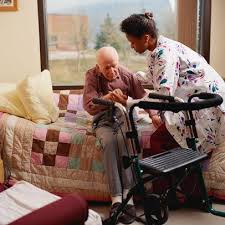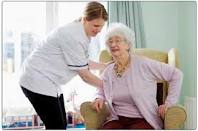The Certified Nurse Aide
Let's start with a brief history of the Certified Nurse Aide or Certified Nursing Assistant. The name is used interchangeably depending on the state or region of the country. I will use the title Nurse Aide or CNA throughout this webpage. Just remember that they are one and the same. If you aren’t interested in reading about their history, skip down to the next heading: The Role of the Certified Nurse Aide.
The Certified Nurse Aide title and job category was inaugurated in 1987 with the Federal Government's passing of the Omnibus budget Reconciliation Act (OBRA). Part of the requirement of OBRA was for each state to develop a nurse aide registry which would create a database of certified nurse aides and track their training, continuing education and work record regarding complaints of abuse/neglect.
These nurse aides go through a comprehensive training curriculum of the federally required 75 hours with at least 16 hours devoted to training in a clinical setting under the supervision of a licensed nurse. Although the minimum requirement is 75 hours of training, 14 states have exceeded those requirements with each state setting their own standards. Delaware, for example, requires 150 total hours of training with 64 hours performed in a healthcare setting.
Before this federally mandated program, nurse aides went through an on-the-job training. Some hospitals and nursing homes instituted their own training curriculum, however, there were no standards to follow and each facility developed their own. As you can imagine, there was a wide range of skills and abilities that nursing assistants might have.
In some facilities, these nurse aides were called nursing technicians because of the skill and training they had developed over the years. Many were trained by registered nurses to perform tasks that are usually performed by licensed nurses such as urinary catheterizations and oral and tracheostomy suctioning. These Nursing Technicians became quite skilled at these tasks and became an integral part of the healthcare setting.
The problem was that not all Nursing Techs had the same training or the same work ethics. Some were wannabe nurses and tried to do more that they were capable of doing with bad consequences for the patient.
The Omnibus Budget Reconciliation Act mandates allow for standardization of procedures that nurse aides can perform. It also provides a registry containing information about each CNA and makes it available to the public. It all makes for a higher quality of care for us all.
The Role of the Certified Nurse Aide

Certified Nurse Aides have been employed in virtually every area of healthcare where patient care is provided. They are a valuable resource in whatever area they work but probably not more needed than in the nursing home. The CNA is the person who provides most of the hands on care of the nursing home resident. She bathes, cleans, dresses, feeds, transfers, checks vital signs, assists with ambulation and provides comfort and conversation to the residents. These tasks are commonly referred to as Activities of Daily Living or ADL’s.
She is also the one who spends more time with the residents and therefore gets to know them well enough to know when they aren’t well. She is usually the first to notify the licensed nurse that there is something wrong with the resident. She has been trained to check vital signs (blood pressure, pulse, respirations and temperature) and report them to the licensed nurse. Although she does not have a license to record vital signs, an experience CNA can alert the licensed nurse of vital signs that are above or below normal.
Certified Nurse Aides are also a valuable member of the home health team. They are utilized in the provision of personal care and assistance with ADL’s the same as in nursing facilities. One big difference is that they have to adapt to the patient’s home environment. Every home is different. She must be able to work independently and be resourceful in the use of the patient’s furnishings and materials. Although she is working alone in the home, she is still under the supervision of the licensed nurse and is operating with directions from the licensed nurse.

Is the Certified Nurse Aide right for your situation?
You now have a lot of information regarding the value of employing a Certified Nurse Aide (CNA) in your home. If you want to hire the CNA on your own, click on the hiring a caregiver link and follow the same hiring guidelines there. If you don’t want the hassles of hiring someone by yourself and you want a home health agency to provide you with the worker, there are several types of home health agencies at you disposal. Each of these agencies provides a particular type of home health service. Each one can provide you with a qualified, trained and carefully screened worker. The decision is yours to make.
Up to now, the employment situations I’ve been writing about are paid out of your pocket book. Your private health insurance may provide some assistance with this service but that is rare. You need to check your insurance policy for coverage or call the company with that question.
If you feel you may qualify for Medicaid assistance, click here, Medicaid Home Health and I will explain what it takes to qualify for Medicaid benefits and what type of home health services may be available to you.
If you are a Medicare beneficiary, click here Medicare Home Health for an explanation of what Medicare Home Health is and how to qualify for the services.
In each of above links, I will explain the differences and how you may qualify for government subsidized care.
If you want to explore other options, leave the Certified Nurse Aide page and go to the Home Page to browse other elder care services available to you.
Certified Nurse Aide Programs
There are many educational programs offered in every state and there are online courses as well. It is my opinion that you will get a better learning experience if you actually attend a class in your geographical area.
To find a CNA course in local area, do an online search or call your state's Board of Nursing or your state's Nurse Aide Registry Program.
Recent Articles
-
I STILL MATTER
Dec 23, 24 08:37 PM
I STILL MATTER As time passes on I turn the next page to discover a new me while I continue to age. I may no longer be who I was long ago but I still -
Relocating Your Elderly Parents
Jun 10, 23 05:29 PM
Relocating your elderly parents can be very difficult -
Side Jobs for Senior Caregivers
Jun 10, 23 05:03 PM
5 tips for starting a side job that will allow you to bring in income while caring for your loved one.
